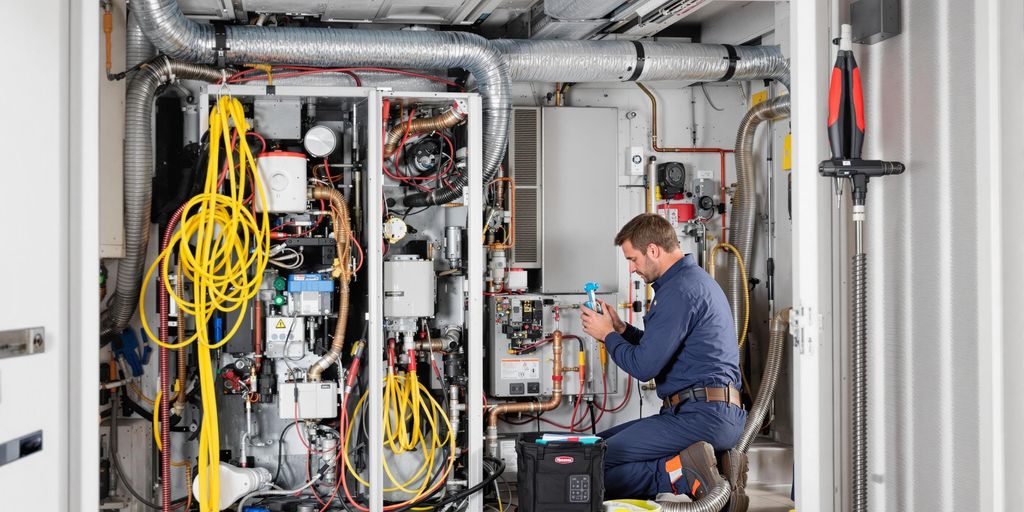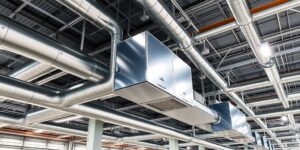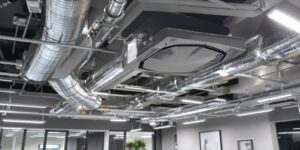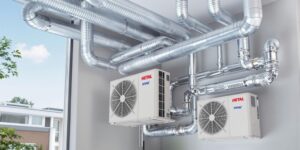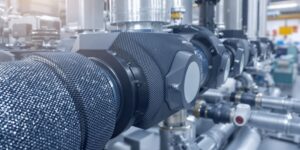Taking care of your HVAC system isn’t just about comfort—it’s about saving money and avoiding headaches down the road. Homeowners often overlook the importance of regular maintenance, but a little attention can go a long way. From changing filters to checking ductwork, these tips will help keep your system running smoothly. And if you’re not sure where to start, don’t worry! We’ve got you covered with some straightforward advice to help you maintain your HVAC system in tip-top shape throughout 2024.
Key Takeaways
- Regularly change air filters to maintain airflow and efficiency.
- Keep outdoor units clear of debris to ensure proper operation.
- Inspect ductwork for leaks to prevent energy loss.
- Optimize thermostat settings for energy savings.
- Schedule professional HVAC check-ups at least once a year.
Regular Filter Replacement Strategies
Understanding Filter Types
When it comes to HVAC filters, not all are created equal. There are several types to consider, each with its own benefits and drawbacks. Fiberglass filters are the most basic and cost-effective, but they need frequent replacement. Pleated filters, on the other hand, offer better filtration and last longer. For those with allergies, HEPA filters are the gold standard, capturing up to 99.97% of airborne particles. Knowing your filter type is crucial for both air quality and system efficiency.
Setting a Replacement Schedule
Having a filter replacement schedule is key to maintaining your HVAC system. Ideally, filters should be checked monthly and replaced every 1-3 months, depending on the type and usage. Homes with pets or allergy sufferers might need more frequent changes. Keeping a calendar reminder can help you stay on track. A regular fall HVAC maintenance checklist can also help ensure you don’t miss this essential task.
Signs of Clogged Filters
Recognizing when a filter is clogged can prevent larger HVAC issues. Signs include reduced airflow from vents, increased dust around the home, and a noticeable drop in heating or cooling efficiency. If your energy bills are creeping up without explanation, a clogged filter might be the culprit. Regularly inspecting filters for dirt and debris can save you a lot of headaches and money in the long run.
Regular maintenance like changing air filters is a simple yet effective way to keep your HVAC system running smoothly and efficiently. Don’t wait for a problem to arise; proactive care can prevent costly repairs and improve indoor air quality.
Outdoor Unit Maintenance Practices

Clearing Debris and Obstructions
Keeping your outdoor unit free from debris is like giving your HVAC system a breath of fresh air. Leaves, twigs, and dirt can pile up around the unit, blocking airflow and making it work harder than it needs to. Make it a habit to check the area around your unit regularly. Here’s a quick checklist:
- Clear away leaves, sticks, and any other debris.
- Trim back plants and bushes at least two feet from the unit.
- Ensure nothing is sitting on top of the unit.
A little attention here goes a long way in keeping your system running smoothly.
Checking for Proper Airflow
Proper airflow is key to an efficient outdoor unit. If your unit isn’t getting enough air, it can overheat and shut down. Here’s how to ensure it’s breathing easy:
- Inspect the Unit: Look for any visible signs of obstruction.
- Check the Fins: These can get bent easily; use a fin comb to straighten them if needed.
- Listen for Strange Noises: Unusual sounds can indicate airflow issues.
Inspecting Electrical Connections
Electrical connections are the lifeline of your HVAC system. Loose or corroded connections can lead to serious problems. Here’s what you can do:
- Turn Off the Power: Always make sure the power is off before inspecting.
- Look for Corrosion: Check terminals and wires for any signs of rust or wear.
- Tighten Connections: Ensure all connections are snug and secure.
Regularly checking these components can prevent unexpected breakdowns and costly repairs. Keeping your outdoor unit in good shape not only prolongs its life but also ensures your home stays comfortable year-round.
Ductwork Inspection and Repair
Identifying Leaks and Gaps
When it comes to maintaining your HVAC system, checking your ductwork for leaks and gaps is key. Leaky ducts can waste a lot of energy, as they let the air escape before it even reaches the rooms in your house. To spot these issues, start by feeling around the ducts for any noticeable air drafts. You can also look for dust or dirt streaks, which often indicate air is escaping. If you find any, it’s time to seal them up.
Sealing Ductwork Effectively
Once you’ve identified leaks, sealing them properly is the next step. There are a few methods to do this:
- Use mastic sealant – This is a sticky paste that works great for sealing gaps. Just apply it over the leaks with a brush.
- Duct tape – Not the regular kind, but a special foil-backed tape designed for ducts. This can be effective for small gaps.
- Aerosol-based sealant – This is sprayed into the ducts and can seal leaks from the inside.
Make sure the ducts are clean and dry before you start sealing. A proper seal will keep your system running efficiently and your home more comfortable.
Cleaning Ducts for Improved Air Quality
Cleaning your ducts is just as important as sealing them. Over time, dust, pet hair, and even mold can build up, reducing the quality of the air in your home. Here’s a simple way to clean them:
- Start by removing vent covers and washing them with soap and water.
- Vacuum the ducts using a long hose attachment to reach as far into the ducts as possible.
- Consider hiring a professional for a thorough cleaning if it’s been a while since your last one.
Keeping your ducts clean not only improves air quality but also helps your HVAC system work more efficiently.
Regular ductwork maintenance is a small investment that can lead to significant savings on energy bills and ensure a healthier home environment. Always keep an eye on your ducts and address any issues promptly to maintain optimal performance.
Thermostat Optimization Techniques
Choosing the Right Thermostat
Picking the right thermostat for your home is like finding the perfect pair of shoes—it needs to fit well and suit your lifestyle. Smart thermostats are a popular choice these days because they learn your habits and adjust settings automatically, helping you save on energy bills. Consider your needs: if you want something simple, a basic programmable thermostat might do the trick. For tech enthusiasts, a smart thermostat with Wi-Fi capabilities offers more features and remote control via your smartphone.
Programming for Energy Efficiency
Once you have the right thermostat, programming it correctly is key to maximizing efficiency. Set your thermostat to lower temperatures during winter nights and higher during summer days when you’re not home. This simple step can lead to noticeable savings on your energy bill. Many thermostats allow you to set a schedule that matches your daily routine, ensuring comfort when you’re home and savings when you’re not.
Monitoring Temperature Settings
Regularly checking your thermostat settings ensures your home remains comfortable while keeping energy use in check. Make adjustments based on the season or changes in your schedule. If you notice your HVAC system running constantly, it might be time to reevaluate your settings. Small tweaks can make a big difference in both comfort and cost.
A well-optimized thermostat can lead to significant reductions in energy consumption, making it a smart investment for both your wallet and the environment.
Professional HVAC Maintenance Importance
Benefits of Annual Inspections
Getting your HVAC system professionally inspected each year can save you a ton of headaches down the road. Regular check-ups help catch small issues before they turn into big, expensive problems. Plus, a well-maintained system runs smoother, which means lower energy bills and a longer life for your equipment. Here’s what you can expect from an annual inspection:
- Thorough cleaning of the system to improve efficiency.
- Checking refrigerant levels and ensuring there are no leaks.
- Inspecting and tightening electrical connections.
- Evaluating the thermostat for accuracy.
What to Expect During a Service Call
When a technician comes over for a service call, they don’t just poke around and leave. They’re on a mission to make sure everything’s running as it should. Here’s the lowdown on what happens:
- System Inspection: The tech will look over the entire system, checking for wear and tear.
- Component Testing: Key parts like the blower motor and heat exchanger get a thorough test.
- Efficiency Assessment: They’ll see if your system is running as efficiently as it could be.
- Safety Checks: Ensuring there are no potential hazards, like faulty wiring.
Choosing the Right HVAC Technician
Not all HVAC technicians are created equal, so picking the right one is crucial. Here’s how to make sure you’re getting someone who knows their stuff:
- Check Credentials: Make sure they’re licensed and insured.
- Look for Experience: An experienced technician will know how to handle a variety of systems.
- Ask for References: A good tech should have happy customers willing to vouch for them.
Professional HVAC maintenance is more than just a routine check-up. It’s about ensuring your home stays comfortable and your system runs efficiently, saving you money and hassle in the long run.
Seasonal HVAC Maintenance Checklist

Maintaining your HVAC system isn’t just about keeping your home comfortable; it’s also about ensuring efficiency and extending the lifespan of your equipment. Here’s a comprehensive checklist to help you manage your seasonal HVAC maintenance tasks.
Monthly Maintenance Tasks
- Check and replace air filters: Dirty filters can reduce airflow and efficiency. Aim to change them every month, especially during peak seasons.
- Inspect indoor vents: Ensure they are clean and unobstructed by furniture or debris. This helps maintain proper air circulation.
- Clean the outdoor unit: Keep the outdoor unit free from leaves, dirt, and other debris. A simple wash with a hose can do wonders.
Quarterly and Annual Tasks
- Inspect ductwork for leaks: Leaky ducts can lead to energy loss. Seal any gaps with appropriate duct tape or sealant.
- Check thermostat settings: Make sure your thermostat is set for optimal energy efficiency and comfort.
- Examine electrical connections: Look for any loose or frayed wires that might pose a safety risk.
Preparing for Seasonal Changes
- Schedule a professional inspection: Before the heating or cooling season kicks in, have a professional check your system. They can spot potential issues that you might miss.
- Test your system’s performance: Run your HVAC system to ensure it’s working properly before the temperature changes.
- Adjust thermostat programming: Update your thermostat settings to match the upcoming season, ensuring energy efficiency.
Regular maintenance can save you from unexpected breakdowns and costly repairs. By keeping up with these tasks, you’ll not only prepare your HVAC system for fall but also enjoy a more comfortable and energy-efficient home year-round.
Energy Efficiency Enhancements
Utilizing Programmable Thermostats
Switching to a programmable thermostat can be a game-changer for your home’s energy efficiency. These devices help you control your HVAC system more precisely, adjusting the temperature based on your daily schedule. This means you can set it to lower the heat when you’re not home and warm up just before you return. Over time, this can lead to noticeable savings on your energy bills. Plus, some models are even smart enough to learn your habits and make adjustments automatically.
Incorporating Ceiling Fans
Ceiling fans are more than just a way to cool down in the summer. They can circulate warm air during the winter months too. By reversing the fan’s direction, you can push warm air down from the ceiling, helping to keep your rooms cozy without cranking up the thermostat. Here’s a quick list of benefits:
- Lower energy consumption
- Improved air circulation
- Enhanced comfort year-round
Improving Home Insulation
Good insulation is the backbone of an energy-efficient home. If your house is poorly insulated, you’re likely losing heat in the winter and cool air in the summer, making your HVAC system work overtime. Consider these tips:
- Check for drafts around windows and doors and seal any gaps.
- Add insulation to your attic and walls if needed.
- Use heavy curtains to help keep the heat in during colder months.
Insulating your home properly is one of the most effective ways to reduce energy costs and improve comfort. It might require an upfront investment, but the long-term savings and increased comfort make it worthwhile.
By following these strategies, you not only enhance your home’s energy efficiency but also extend the lifespan of your HVAC system. For more insights on improving your furnace’s energy efficiency, consider scheduling annual maintenance.
Conclusion
Taking care of your HVAC system might seem like a chore, but trust me, it’s worth it. By keeping up with regular maintenance, you’re not just ensuring a comfy home; you’re also saving yourself from unexpected repair bills. Simple things like changing filters and checking for leaks can make a huge difference. And while it’s great to tackle some of these tasks yourself, don’t forget the pros. They have the know-how to spot issues you might miss. So, make a habit of these tips, and your HVAC will thank you with years of smooth operation. Here’s to a cozy and worry-free home!
Frequently Asked Questions
How often should I change my HVAC filter?
You should change your HVAC filter every 1 to 3 months. If you have pets or allergies, consider checking it more often.
What are the signs that my HVAC system needs maintenance?
If your HVAC system is making strange noises, not heating or cooling properly, or your energy bills are higher than usual, it might need maintenance.
Can I do HVAC maintenance myself?
Yes, you can do some basic tasks like changing filters and cleaning vents. However, it’s important to have a professional check your system at least once a year.
Why is professional HVAC maintenance important?
Professional maintenance helps catch small problems before they become big ones and ensures your system runs efficiently and safely.
What should I do if my HVAC system is not working?
First, check the thermostat and circuit breaker. If everything seems fine, call a professional to inspect your system.
How can I make my HVAC system more energy efficient?
You can make your system more efficient by using a programmable thermostat, sealing ducts, and ensuring your home is well-insulated.
